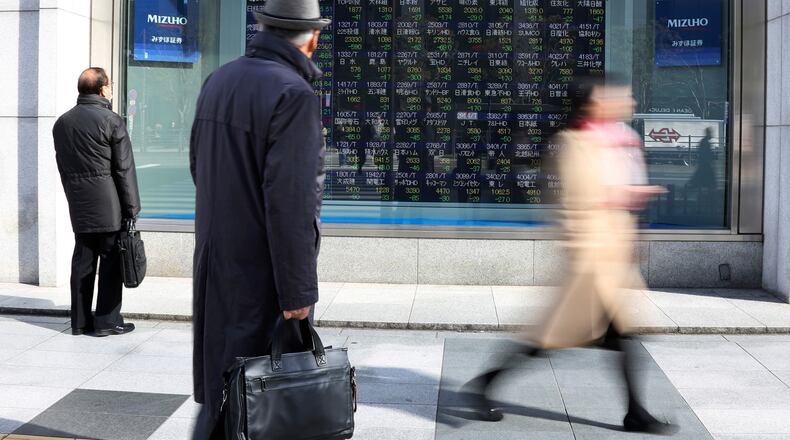Rob Russell, president of Russell Total Wealth Management said the the market may be reacting to “uncertainty vs. certainty.”
Much of the day’s moves have been triggered by “limit orders,” and that action may continue, Russell warned.
Such orders ensure a stock’s automatic sale if it falls a certain percentage or down to a certain price.
“I think it’s been a great ride,” he said. “People have limit orders as the market cascades down, and they’re being automatically acted on.”
We’re not yet in “correction” territory, in which a market loses 10 percent of its value, Russell said. But we may not be done, either.
“This is called a market pullback,” he said. “It’s actually a healthy thing, although it doesn’t feel like it at the time.”
More volatility is ahead, but he thinks also cooler heads will soon prevail.
UPDATE: 3:35 p.m.
Banks tooks some of the biggest losses. Wells Fargo plungedafter the Federal Reserve hit the bank with new sanctions over a scandal that involved opening millions of phony consumer accounts. Bond yields slipped after moving sharply higher Friday.
UPDATE 1 p.m.
William Wood, a certified financial planner with Centerville’s Adams Weath Management Group, said he expected today to be an extension of last week’s losses.
“I don’t think we’re in a correction mode, but we expected volatility in 2018, and I think this is the first example of that,” Wood said.
He thinks the market is facing “a lot of issues,” including an expected increase in interest rates. Some see inflation on the horizon as well.
Wood called today’s stock movements a “risk-adjsted rebalancing.” And he doesn’t think this kind of market is the kind that investors should “sell into.”
With GDP and wages up, “That tells you clearly where the Fed is going,” Wood said.
Investors worried about the prospect of stiffening inflation and an approaching rise in interest rates are watching falling stock markets, in the United States and across the globe.
The Dow Jones U.S. Industrial Average (DJIA) was expected to continue losses this morning from last week.
RELATED: Can Dayton get its mojo back? Economist says yes
UPDATE: 9:45 a.m.
In the first moments after the opening bell Monday, the DJIA was down around 200 points. Futures were pointing to more sell-offs.
On Friday, the DJIA dropped by more than 650 points.
RELATED: Economy kicks it up, adding wages, 200K jobs
Observers think the market is reacting to rising wages. On Friday, the federal government reported that average hourly earnings for private-sector workers climbed 0.34 percent in January, notching a rise of 2.9 percent over the last year.
That represented the strongest wage gain since 2009 — but the trend sparked concerns about inflation and rising interest rates.
The Stoxx Europe 600 is falling, and the Nikkei Stock Average in Japan has seen its biggest fall since November 2016, reports said.
Jeff Haymond, dean of the Cedarville University School of Business Administration, said recent stock valuations have hit historical highs. And he cautioned that the DJIA hasn’t even hit 10 percent “correction” territory yet.
“You can expect they (stock values) will come back down to a more normal level,” he said. “That’s one factor.”
Haymond also believes a reversal of the Fed’s “easy monetary policy” is also to be expected -- and even welcomed.
“It’s due for a correction anyway,” he said.
WAKING UP: The stock market has been unusually calm for more than a year. The combination of economic growth in the U.S. and other major economies, low interest rates, and support from central banks meant stocks could keep rising steadily without a lot of bumps along the way. Experts have been warning that that wouldn't last forever.
The decline over the last few days isn't large by historic standards, but stocks haven't suffered a 5 percent drop since the two days after Britain voted to leave the European Union in June 2016. They recovered those losses within days. The market hasn't gone through a 10 percent drop since early 2016, when oil prices were plunging as investors worried about a drop in global growth, which could have sharply reduced demand. U.S. crude hit a low of about $26 a barrel in February of that year.
The Associated Press contributed to this story.
About the Author

